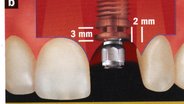Dental Implants: Are they right for you?
What you should know:

1. Dental Implants: Are they right for you?
If you are missing one or more teeth and would like to restore your ability to smile,
speak and eat with comfort and confidence, then dental implants may be right for you.

Perhaps your dentures don't fit as securely or comfortably as they once did. Perhaps you hide your smile
because of spaces from missing teeth. Or, perhaps you have loose teeth that need to be stabilized after
treatment of advanced gum disease. If any of these situations keep you from feeling good about yourself
and your smile, dental implants may be a solution for you. Technological advancements in dental materials
and techniques have improved the success rate of implants, enabling many patients to enjoy comfort and confidence
in their oral health. Now, you can have implant replacement teeth that look, feel and function just like your natural teeth.
You'll be able to enjoy many of the foods you now have to avoid without fear, discomfort or embarrassment.
And you'll find yourself smiling more naturally and with confidence again.
2. What are dental implants?

Dental implants are artificial substitutes for natural tooth roots. The implants- small anchors shaped like screws
or cylinders- are placed into the jawbone. Replacement teeth are attached to the part of the implant that projects
through the gums. Used for many years, dental implants are effective, natural-looking replacements for missing teeth.
Most specialists in dental implants work as a team- the surgeon surgically prepares your jaw and a prosthodontist,
the restorative specialist, makes your prosthesis (replacement teeth). The implant systems which are used to achieve
"osseointegration" provide you, the patient, with an increased probability of success.

3. What is osseointegration?
Osseointegrotion is the direct contact between the implant surface (predominately titanium oxide) and the surrounding bone.
The union of titanium implant and living jaw bone is the scientific achievement which restores the function of the
"tooth-less" jaw to an almost natural state.
4. What do dental implants do?
Dental implants can provide non-removable tooth replacement in the toothless jaw. Dental implants can provide support
for a full denture, making it more secure and comfortable. Dental implants can also support a fixed bridge, eliminating
the need for a removable partial denture. Of course dental implants can also replace just one missing tooth.
Instead of cutting the adjacent teeth (and risk root canal therapy!) as we did years ago, we can now avoid
connecting the teeth and replace only the one tooth that is missing!
5. Would I benefit from a dental implant?
Although dental implants have brought a comfortable, confident smile to many patients, they are not for everyone.
The ideal candidate has good general health, good oral health and adequate bone in the jaw to support the implant.
Equally important, the ideal candidate is willing to commit to conscientious oral hygiene and regular dental visits.
We can help you decide if a dental implant Is right for you. Essential to the decision is a comprehensive dental examination.
Dr. Doundoulakis will review your medical and dental history,
thoroughly examine your oral tissues and supporting bone in the jaw, and check the way your teeth fit together when you bite.
X-rays and models will be taken and analyzed, perhaps with the help of a computer.
After this careful examination, our office and the surgeon will talk with you about dental implant options.
You should discuss the benefits, risks, and possible alternative treatments.
6. What are the advantages of dental implants?
Dental implants can support replacement teeth in much the some way as tooth roots support natural teeth.
Dental implants provide an alternative to a denture that wobbles, clicks or causes pain.
Dental implants can also prevent embarrassment about spaces from missing teeth. You can enjoy your favorite foods again.
You can smile and speak with confidence.

When reputable dental implant systems are placed by trained dental specialists,
they can hove a probable success rate of over 90 percent. In fact, with effective oral care at home and regular
dental visits, dental implants have lasted as long as 20 years and may last a lifetime.
7. What are the disadvantages?
A dental implant requires a greater financial investment than a removable bridge or conventional denture. On the other hand,
an implant can offer advantages in terms of comfort and appearance benefits that many patients find well worth the cost.
A dental implant also requires an investment in time, perhaps three to nine months from start to finished.
If you consider that implants have lasted as long as 20 years and can last a lifetime,
the investment in time is quite reasonable. As with any surgical procedure, dental implants involve a risk of infection.
Occasionally, an implant may loosen and require replacement. Because each person is unique,
implant success cannot be guaranteed. In some instances the time frame for treatment can be shortened considerably,
with the final teeth delivered in only a few short months from start to finished!
8. What is the treatment like?
The treatment will vary depending upon the type of implant and the health of the patient.
For example, many patients can receive implant treatment in the dental office.
A brief hospital stay may be necessary for other patients.
The first step is placing the implants into the jawbone. After this surgical treatment,
the bone in the jaw attaches to the implants, holding them firmly in place.
The attachment of bone to the implant usually takes three to six months. Second, small metal posts
or cylinders are attached to the implant, projecting through the gums.
After this second surgical treatment, the gums take several weeks to heal.
Third, replacement teeth are created and securely attached to the small metal posts or cylinders.
Several fittings of the new teeth may be needed. After treatment is completed,
brushing, flossing and visiting your dentist regularly are essential to the success of the dental implant.
9. Will I have to keep my dentures out during the 3-6 month healing phase?
You should be able to wear your partial dentures or full dentures after the surgical procedure is done.
The basic appearance that you have with your full dentures or removable partial dentures should be similar
to how things looked before the implants were done.
10. How quick will I get my implant teeth?
With many implant cases, 3-6 months' wait is necessary because of the healing action that occurs
between the bone and the titanium oxide implant surface. There is an interchange on a cellular level
between the titanium oxide and the bone which in turn allows for the attachment. One may find that this time
(3-6 months) may increase towards a longer period of evaluation to allow for further healing.
This is based on the fact that healing and cellular changes will continue to occur even after the 3 month period.
But recently, much has been done on placing implants, loading them almost immediately, and then delivering replacement teeth within a few DAYS! For these cases, patients can go from NO teeth to FIXED (non-removable) teeth immediately!
11. Is it possible that the bone could be surgically exposed and no implants done?
It is possible that in rare instances the surgeon may find that once the bone is uncovered,
there are variations in bone contour or health which would preclude implants from being placed.
In rare instances, surgical implant sites are actually drilled before this can be determined.
However, this is the exception, not the routine. If a CATSCAN is recommended before the surgical procedure,
this possibility is minimized or eliminated.







2 comments:
Hello,
Nice blog i like it about dentist and it's work
cosmetic dental
It's necessary we know that patients need to be very comfortable during treatment. Had a severe phobia for dental crown implants. Was quite nervous to visit dentist Torrance suggested by my friend. Even she made the appointment by herself and accompanied me to the clinic. But was amazed with the kind behaviour of doctor.
Post a Comment